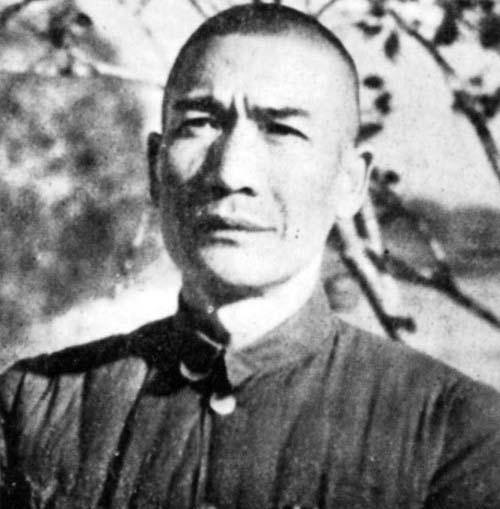As we all know, the Nanchang Uprising fired the first shot of our Party's armed resistance to Kuomintang rule, but soon after the uprising broke out, Nanchang City was counterattacked by the Kuomintang army, and the weak rebel army could only be forced to go south and ended in defeat.
When talking about the reasons for the defeat of the Nanchang Uprising, in addition to factors such as the disparity in strength between the enemy and ourselves, there is also a point that cannot be ignored, that is, many generals who are not firm in their revolutionary will have chosen to turn against each other, such as Ou Zhen.

On August 1, 1927, Ou Zhen followed Ye Ting to the Nanchang Uprising and served as the commander of the 71st Regiment of the 24th Division of the 11th Army. In the Battle of Tangkeng, the rebel troops fought hard for many days with Xue Yuebu, who had come to encircle and suppress them, and at the critical moment when the two sides were deadlocked, Ou Zhen suddenly turned against the enemy and gave the other side an opportunity to take advantage of it, and the rebel army suffered heavy losses as a result.
The defeat in this operation seriously disturbed the morale of our army, and even General Xiao Ke once sighed: "The Battle of Tangkeng was a turning point in the Nanchang Uprising from victory to defeat. ”
So, we can't help but ask: Why did Ou Zhen turn against him? Is it just because of greed and fear of death?
In fact, this is also one of the historical doubts in the "Ou Zhen Defection Incident", what is his motive? The reasons may be more complicated, but at least one thing can be ruled out, Ou Zhen is indeed not a greedy person who is afraid of death.
Ou Zhen, a native of Shaoguan, Guangzhou, had worked as a primary school teacher, but later felt that the country was in danger, and turned to writing from Rong, and during the Northern Expedition, he had been promoted to the commander of the 3rd Battalion of the Ye Ting Independent Regiment of the 12th Division of the 4th Army.
The name of Ye Ting's independent regiment is well known, and Ou Zhen can become a battalion commander in the independent regiment, and it is conceivable that his ability is indeed extraordinary.
In the Battle of Tingsi Bridge in 1926, it was the 3rd Battalion led by Ou Zhen who fought in the vanguard. In order to avoid arousing the vigilance of the enemy, Ou Zhen ordered that no shots should be fired, and that all enemy troops should be engaged in white-knife warfare. In this way, Ou Zhen took a "machete brigade" all the way to the city, and personally led the death squad to charge to death, climbing up the city under the dense fire of the enemy.
After that, Ou Zhen fought in Jiangxi, Henan and other places, always rushing to the front whenever there was a war, and his prestige was also well-known in the Northern Expeditionary Army.
From this point of view, Ou Zhen is obviously not a greedy person who is afraid of death, and will not defect in order to survive.
It has also been suggested that Ou Zhen joined the Kuomintang army after the rebel army was dispersed, and strictly speaking, it cannot be regarded as a defection. Due to the lack of relevant historical information, the specific cause of the "Ou Zhen defection incident" is difficult to prove for a while.
However, after switching to the Kuomintang camp, Ou Zhen did not disappoint, and successively fought bloody battles with the Japanese and Kou in large-scale battles such as the Battle of Songhu, the Battle of Changsha, and the Battle of Changde, and repeatedly made battle achievements, all the way to the commander-in-chief of the 10th Group Army, which can be described as a well-known general of the War of Resistance.
After the victory of the Anti-Japanese War, Ou Zhen was appointed commander of the Third Corps, fighting against the East China Field Army in Shandong, and as a result, in the Battle of Menglianggu, he was beaten by Hua Ye, and Ou Zhen was also beaten to death and transferred to the Army University to continue his studies.
Later, although Ou Zhen served as the commander of Guangdong security and the deputy commander-in-chief of Hainan defense, he did not have the strength to fight back in the face of the overwhelming siye army, so he had to flee to Taiwan Island.
In addition, Ou Zhen is also very attentive to the construction of his hometown, even during the War of Resistance, he often returned to his hometown after the march to help his hometown build schools, build reservoirs, etc. To this day, there is also Ou Zhen's memorial pavilion in his hometown.
In his later years, Ou Zhen was homesick and often said to people: "The iron rule of history, unity will be divided for a long time, a long time will be united, and the peaceful reunification of the country will eventually come." ”
On February 13, 1969, Ou Zhen died of illness at the age of 70 and was posthumously awarded the rank of second-class general in the Army.
Throughout Ou Zhen's life, leaving the revolutionary ranks is a stain that he cannot erase, but in terms of resisting the enemy and benefiting his hometown, it is still commendable.